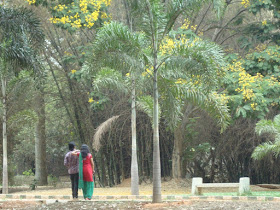It was in the early seventies. I was in Mysore – studying
Engineering. Ravishankar was billed to perform in Bangalore. The cheapest
ticket was a whopping ten rupees. I asked my father if I could go to Bangalore
and attend the concert. The answer was a no, we could not afford it. It was
also a matter of principle – we should not spend that kind of money on
entertainment.
I was crestfallen but there ended the matter.
In 1980 I was working in Bombay and there was this all night
concert at the St Xavier’s college with N Rajam and Sangeetha concert followed
by Ravishankar. I bought a ticket, weeks ahead, and went and listened to him.
When he came on the stage the organisers announced that he was to receive the
Padmavibhushan. An electric moment. The audience cheered and clapped and whistled
for minutes. He was very gracious and he had this magical quality that created
excitement wherever he went.
The story that I want to remember is what I heard from
someone. He was there when this happened. All my facts may be wrong but the
story is true or accurate.
There was this all night concert in the race course in
Calcutta. Ravishankar’s was the second concert and the first one was by a great
artist but, with a drinking problem. He was half an hour or more late coming to
the stage. The audience was getting restive. Finally when he was escorted to
the stage, he was weaving and staggering. He could hardly sit and play his
instrument. There were loud protests and there were signs of things turning
violent. Ravishankar came on stage with his accompanists and the first artist
was taken off the stage. He was at the venue far earlier than his time – he wanted
to listen to the first concert. His tastes were eclectic.
Ravishankar was all grace. He requested the audience to
quieten and they did. He said something like, “The man who has just gone off
the stage is a real genius with prodigious talent and accomplishment. Such
geniuses sometimes have problems and we should ignore that. When they do play,
they play like no one else can. We should take that and leave the rest. I know
that you have come here to listen to good music. In his place, I will play for
you and hope I can compensate in some measure.”
He went on to play through the previous artist’s time and
his own too.
 |
A tribute to Ravishankar by my friend Anwar - a brilliant artist.
|
That defines Ravishankar like nothing else can. He was a
lover of music and musicians and a phenomenal, almost unparalleled, man and
musician himself.
There is another incident that gives one a glimpse of the
man. He was playing in Dharwar and the venue was close to the railway track. As
he was playing, a train approached and blew the whistle. The listeners were
disturbed by this harsh intrusion. Not so, Ravishankar. He just pulled the
string hard and reached the note of the whistle and thereby included that into
the raga he was playing. What could have been, actually was, a harsh intrusion
was converted into something the audience cheered!






























